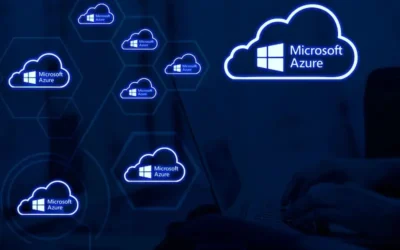The hybrid workplace model is constantly evolving, which presents several challenges in the context of cybersecurity for hybrid teams.
By its very nature, the hybrid framework introduces new vulnerabilities, from remote access points to unmanaged devices, and opportunistic cybercriminals are capitalising on these gaps.
To stay one step ahead of the cyber threat landscape while experimenting with hybrid practices, businesses must think outside the box by implementing more forward-thinking solutions than those offered by traditional defences.
Unique challenges around cybersecurity for hybrid teams
A business that adopts a hybrid working model comes face-to-face with unique challenges in the context of cybersecurity:
- Hybrid teams are entirely reliant on virtualisation to perform their duties from multiple locations, which changes their attack surface and heightens the risk of cyberattack.
- The use of numerous personal devices creates additional entry points for cyber criminals to access.
- The use of home WiFi networks may be less secure than business connections, creating easy avenues for the interception and malicious use of data.
To prevent the hybrid workforce from falling victim to these vulnerabilities, business owners need to develop an awareness of the latest threats and how they can best protect their organisations against them.
New cybersecurity threats in 2025
Here is a rundown of the latest cybersecurity threats that have the potential to cause serious issues among hybrid teams across 2025 and beyond.
Cloud vulnerabilities compromising cybersecurity for hybrid teams
Hybrid teams rely heavily on cloud-based systems, but a single misconfiguration can leave critical data exposed. While cloud infrastructure has many advantages in the context of information security, it can also place an organisation in jeopardy if not properly managed.
To avoid this, companies must be aware of the shared responsibility model, which divides accountability for the management of the platform between the provider and the workforce utilising it.
Businesses can set their teams up for success in this area by providing professional cybersecurity awareness training that will enable each employee to navigate the cloud safely and with confidence.
Sophisticated AI-powered attacks
In 2025, cybercriminals are taking phishing and deepfake attacks to the next level with the use of AI tools.
These tools enable them to generate highly convincing messages, voice recordings and even video calls that impersonate members of a company’s leadership team or trusted vendors.
Given that these deepfakes exploit remote communication tools that are used frequently within a hybrid work environment, this particular threat poses significant consequences for businesses, ranging from financial loss to reputational damage.
An increase in shadow IT
Shadow IT, which refers to the use of IT-related hardware or software in a business setting without the approval of the company’s IT department, has become a top concern for busy organisations.
Shadow IT is particularly apparent in hybrid settings with a bring-your-own-device (BYOD) policy, where many employees rely on personal devices when working across multiple locations. This naturally creates scenarios in which applications and tools are used without the knowledge or control of the IT department.
Worse still, these devices rarely have enterprise-grade protection, creating entry points for ransomware, data exfiltration and regulatory breaches, especially in sectors governed by GDPR.
Complex supply chains are expanding the attack surface
As hybrid teams use more and more third-party SaaS tools for collaboration and productivity, the attack surface grows.
In 2025, attackers are increasingly targeting these third-party platforms to gain indirect access to corporate networks. This access is usually attained through targeting third-party vendors or using stolen credentials.
Without a rigorous vendor risk management process, one weak link can compromise the entire organisation.
Stricter compliance requirements
This year, pressure is mounting on Irish businesses to comply with tighter regulations set out by various EU-led directives, such as the Cyber Resilience Act and NIS2.
The latter, which was published by the National Cyber Security Centre (NCSC), requires member states to enhance their cybersecurity capabilities through several practical measures, such as “supply chain security, vulnerability management, and cybersecurity education and awareness”.
The most reliable route to ensuring your business is fully compliant with these new directives is through working with an experienced managed IT services provider who won’t leave anything to chance.
Strategies to boost cybersecurity among hybrid teams
Given the heightened potential for cyberattacks among hybrid teams, robust protections must be put in place to safeguard company data and operations.
A successful protective strategy should include:
- Providing regular, role-specific cybersecurity awareness training to employees to reduce the risk of human error in real-world scenarios.
- Embracing cloud security best practices by carrying out regular audits, encryption and secure on-prem and cloud-based backups to prevent a single vulnerability from becoming a catastrophic breach.
- Adopting a Zero Trust framework that serves to verify every user and device associated with an organisation, regardless of their location.
- Implementing comprehensive endpoint protection with modern EDR (Endpoint Detection and Response) solutions, automatic patch management and strong multi-factor authentication (MFA).
Securing managed IT services will enable you to enact these protective measures with confidence, knowing that the experts are safeguarding your business against evolving cyberattacks that target remote access points and vulnerable endpoints.
Evade evolving threats with expertly managed IT services from Calnet IT
As a business owner, protecting your hybrid team means understanding how they work, where they work, and how to safeguard them without slowing them down.
At Calnet IT Solutions, we support Irish organisations with these efforts, providing real-time, human-centred support, which includes Cyber Security Awareness Training for staff, a vital component of a powerful cybersecurity strategy.
Our team of over 25 specialists delivers proactive solutions tailored to your business size, goals and industry. From SMEs to large enterprises, we provide scalable cybersecurity services that prevent threats before they impact your bottom line.
Cybersecurity for hybrid teams simplified with Calnet IT
With over 20 years of experience, 98% customer retention and a reputation built on relationships, we bring peace of mind and clarity to businesses navigating the complex terrain of cybersecurity.
Whether you’re looking to train your staff, implement Zero Trust principles or secure cloud platforms, we’re here to help. Our Dublin-based team serves businesses nationwide, delivering simplicity, reliability and hands-on support that puts people first.
Contact us today to discover how our Cyber Security Awareness Training and tailored IT services can help your hybrid workforce stay secure in 2025 and beyond.






